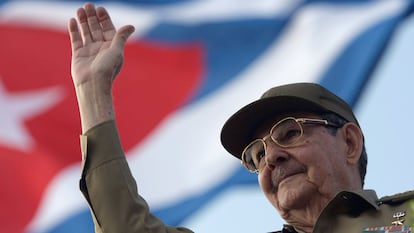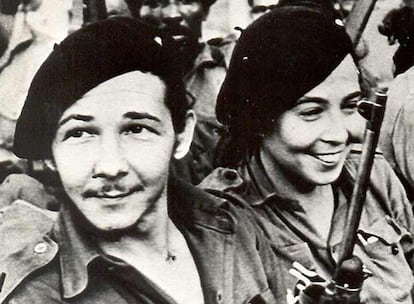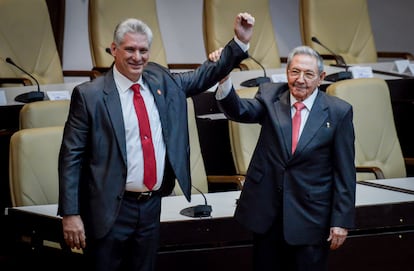Continuity or change? Cuba’s leaders debate the country’s future
The Cuban Communist Party is holding a congress that could signal the departure of historic veterans as the island grapples with an economic crisis that requires urgent action

Unity and continuity. These are the main themes underpinning the 8th Congress of the Communist Party of Cuba (PCC) due to begin on Friday in Havana. The gathering comes at a key moment: the island nation is grappling with one of the worst crises in its entire history even as the revolution’s historic leaders, starting with Raúl Castro, are on their way out. Raúl Castro is 89 years old. Ramón Machado Ventura, currently the second secretary of the PCC, will turn 91 in October. The veteran commanders Ramiro Valdés and Guillermo García are 88 and 92, respectively. A generational change is underway for obvious reasons, and if unity and continuity are the chosen catchwords, it is not for the fun of it: a cycle is ending that began in 1959 when a group of revolutionaries first came down from the Sierra Maestra and went on to occupy the country’s top leadership positions.
It was Raúl Castro himself who ordered the change at the last PCC congress, where he proposed a two-term limit for a top political position and a maximum age of 60 to join the PCC’s Central Committee. He also suggested an age limit of 70 for holders of the highest posts in this political organization – the only one in the country, and tasked by the Constitution to act as the “leading force of society.” Raúl Castro at one point described this generational change as a “strategic” issue, since what’s at stake is whether the revolution will outlive its founders – thus the continuity leitmotiv.

Nearly all the party leaders at the local and provincial level were born after 1959. But the members of the old guard have continued to occupy important positions, which they now share with leaders of an in-between generation. Inside the PCC’s highest decision-making body, the Politburo, the average age of its members is 69, and eight of its 17 members are over 75 (five of them are members of the military).
The handover to a younger generation has already become a reality in government. President Miguel Díaz-Canel will turn 61 on Monday, and Prime Minister Manuel Marrero was born in 1963. It was Raúl Castro who selected Díaz-Canel as his successor in the presidency, describing him as “the only survivor” of a generation of leaders who were lifted to higher positions by the veterans at various times to guarantee the revolution’s survival, but most of whom later fell out of grace.
Everything will depend on whether the outgoing leaders understand that in order to save the model they helped build, it is necessary to effect profound changeEconomist Omar Everleny
When Raúl handed Díaz-Canel the presidency in 2018, he said that if everything went according to plan, the latter would also become first secretary of the PCC at its 8th Congress. Barring any surprises, this will be the case and the cycle will be complete. But will historic leaders go away completely? Will this continuity remain under their guardianship? What will be the makeup of the Central Committee and the Politburo, and what kind of balance will there be between “old mentality” sectors and reform-oriented ones? Will the new leaders have any leeway to introduce the kind of meaningful changes that reality demands of them, if they wish to do so?
There is a lot of speculation going on, and many questions are still up in the air, but if there is one thing that most political analysts agree on, it’s the fact that the outcome of this congress will be key to the country’s future, as Cuba is facing enormous political and economic challenges. On the economic front, the situation is critical due to the system’s long-term inefficiency and structural problems. The coronavirus pandemic has intensified the trouble – gross domestic product (GDP) fell 11% last year – and the economy has keenly felt the effects of a tightening of sanctions by former US president Donald Trump.
Cubans have been suffering from brutal shortages for months, leading to long lines for essential goods and a lot of citizen discontent. Adding to this is an ongoing monetary reform that has made people lose a lot of purchasing power. Economists feel that the announced opening of the economy, which should considerably facilitate private initiative and pave the way for small and medium businesses, is moving too slowly.
As a matter of fact, one of the major issues to be addressed at the congress is whether there is clear support for a substantial economic reform, which is vital for survival, or whether the effort remains half-hearted. Another factor to take into account is the new scenario created by social media, which has broken the state’s monopoly over messages and its hold on established truths. This new medium is also helping dissidents, and civil society in general, spread their messages.
New leadership

Even though the political challenges are considerable – and nothing is expected to be yielded on this front – there is a consensus that the main battle will be fought on the economic battlefield. “Cuban society in general is exhausted, and it is logical for people to feel pessimistic,” says the economist Omar Everleny. “Changing that view will not be an easy task, but not an impossible one, either.”
Everleny feels that the new leaders that emerge from the 8th Congress could lead Cuba down a more prosperous road “even if they maintain the same ideology as their predecessors.”
“Everything will depend on the balance of power that is created, and on whether the outgoing leaders understand that in order to save the model they helped build, it is necessary to effect profound change, and let the new leaders be bold within limits,” he adds.
Cuban society in general is exhausted, and it is logical for people to feel pessimisticEconomist Omar Everleny
Carlos Alzugaray, a former diplomat and party member, feels that Díaz-Canel will have more freedom to act and more decision-making powers than he does now, the moment he is elected first secretary of the PCC. But the “main obstacle” he will face, says Alzugaray, is “the prevalence of an old mentality throughout the entire government apparatus and party structure that resists change.” Even Raúl Castro has criticized this mentality in the past.
“If all the historic leaders retire along with Raúl, and this also means the current second secretary, José Ramón Machado Ventura [identified as part of the most orthodox sector], then it would be logical to suppose that he will be replaced by someone whom Díaz-Canel trusts, and who will be given increased authority to handle party affairs. It’s important to note that that’s where decisions are made on promotions, rotation and removal of cadres,” says Alzugaray.
This ex-diplomat stresses that it is key for these new leaders to be able to “produce the changes that have been difficult to bring about, yet without breaking with the image of continuity.”
The legitimacy of the historic generation now departing from power emanated from the revolutionary epic most clearly embodied by Fidel and Raúl Castro. But now legitimacy will depend on the new leaders’ management skills and on their ability to achieve results that will give Cubans a better, more prosperous life. It seems clear that what’s been done to date has not worked in terms of reactivating the economy and pulling out of the crisis. As a result, a growing chorus of voices is saying that the continuity tagline must necessarily be associated with sweeping change and transformation, without any attempt at concealment.
According to Rafael Hernández, a scholar and head of Temas magazine, the current crisis makes it indispensable for new leaders to forge “consensus.” Right now Díaz-Canel “is going through the toughest test that a president with little experience in the role can face: an accumulated economic crisis, a costly ongoing reform, an epidemic that is longer than expected, and a US government that does not miss an opportunity for doing the wrong thing. It’s the perfect storm.” Faced with so many combined challenges, the president “only has one option,” says Hernández, noting that “going forward with reforms requires doing politics 24 hours a day.”
The great unanswered question is what Cuba will look like five years from now, when the next PCC congress is due to take place.
English version by Susana Urra.
Tu suscripción se está usando en otro dispositivo
¿Quieres añadir otro usuario a tu suscripción?
Si continúas leyendo en este dispositivo, no se podrá leer en el otro.
FlechaTu suscripción se está usando en otro dispositivo y solo puedes acceder a EL PAÍS desde un dispositivo a la vez.
Si quieres compartir tu cuenta, cambia tu suscripción a la modalidad Premium, así podrás añadir otro usuario. Cada uno accederá con su propia cuenta de email, lo que os permitirá personalizar vuestra experiencia en EL PAÍS.
¿Tienes una suscripción de empresa? Accede aquí para contratar más cuentas.
En el caso de no saber quién está usando tu cuenta, te recomendamos cambiar tu contraseña aquí.
Si decides continuar compartiendo tu cuenta, este mensaje se mostrará en tu dispositivo y en el de la otra persona que está usando tu cuenta de forma indefinida, afectando a tu experiencia de lectura. Puedes consultar aquí los términos y condiciones de la suscripción digital.








































